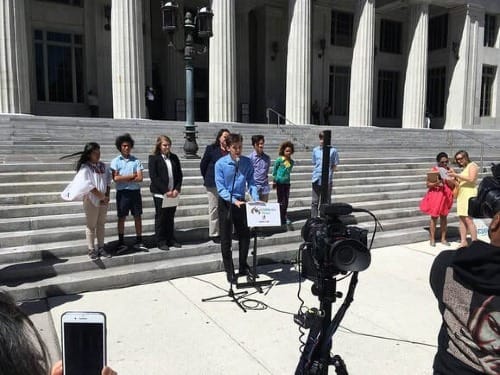Judge Dismisses Youth Climate Lawsuit In Florida

A Florida state court judge ruled on June 1 to dismiss a climate change lawsuit against the state brought by eight young Floridians. The ruling is the latest in a string of setbacks for young people suing their governments at the state and federal levels over the climate crisis.
These youth-led climate lawsuits allege that government-sanctioned climate destruction through actions perpetuating fossil fuel energy systems violate young people’s rights to life, liberty, property, and the pursuit of happiness under the Constitution, as well as impair natural resources necessary for survival and held in the public trust. The lawsuits seek courts to declare that governments are harming young people and to order this harm to stop by creating plans to rapidly slash carbon emissions along science-based guidelines.
In the Florida case, Reynolds v. State of Florida, the youth plaintiffs claim the state government is knowingly endangering Florida’s youth with policies that promote fossil fuels and contribute to climate pollution. Climate impacts like extreme heat, coastal flooding and sea level rise are already occurring in the state and places like the Florida Keys and Miami are especially at risk.
“South Florida is known as Ground Zero for what is happening with climate change in the U.S.,” lead plaintiff Delaney Reynolds, a 20-year-old from Miami, explained during a Zoom web conference on May 27. “The climate crisis is putting places I love here in Florida completely at risk of disappearing.”
In a hearing held June 1, attorneys for the Florida youth plaintiffs argued that these climate change harms are imminent and rise to constitutional violations. Judge Kevin J. Carroll said these arguments were “compelling,” but ultimately decided to grant the state’s motion to dismiss. In a ruling from the bench, he accepted the state’s argument that the court was being asked to solve a political question. Carroll dismissed the case with prejudice, meaning it cannot be brought again, though he did urge plaintiffs to take their case to the appeals court.
“We are disappointed with the outcome,” Reynolds said in a press release following the hearing. “It feels like the cards are stacked against us. We are eager to appeal and keep fighting until this problem is solved and we can live in Florida safely.”
“While we are pleased that the judge acknowledged the gravity and importance of these kids’ legal claims, continued delay is not our friend given the urgency of the climate crisis,” added Andrea K. Rodgers, Senior Litigation Attorney at Our Children’s Trust, a nonprofit organization spearheading the youth climate lawsuits. “We look forward to working towards vindicating the rights of these kids before it’s too late and hope this is just one small step backwards on the path towards justice.”
The dismissal in Florida is the latest setback for youth climate litigation in the U.S. Lawsuits in other states have run into similar obstacles with courts dismissing cases over concerns with judges handling complex policy decisions. Several of those cases are currently under appeal. At the federal level, a panel from the Ninth Circuit Court of Appeals dismissed the landmark Juliana v. United States case in January because the court decided it could not order and oversee the government in setting climate policy.
“We are not asking judges to write policy,” Rodgers said in the May 27 web conference. “We are asking courts to declare the law, to order governments to stop causing constitutional harms to our children.”
The Florida plaintiffs and their counsel say they will take their case to the Florida First District Court of Appeals.


